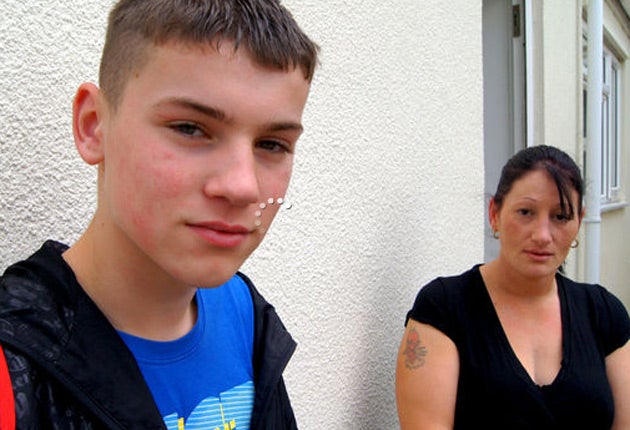Last Night's TV - Kids in Care, BBC1; Wedding House, Channel 4; Don't Tell the Bride, BBC3
To the heart of the matter

Man hands on misery to man/ It deepens like a coastal shelf," Larkin famously wrote in "This Be the Verse", showing a slightly better grasp of inherited distress than submarine geology. The point about a coastal shelf after all is that it doesn't deepen very much. That's why it's called a shelf. Or perhaps Larkin grasped all along that the deepening wasn't really the thing, just the flat, submerged continuity of human unhappiness. It was a line that came to mind more than once while watching Kids in Care, anyway – a Panorama special, which followed Coventry Social Services for six months as its beleaguered workers tried to prevent children from taking up their only parental legacy: addiction and social exclusion. On the brink of spending cuts, it was an unnerving glimpse of how meagre the resources are, and how a system expressly designed to protect children sometimes can't help but end up harming them further.
By definition these weren't easy children to help. "He can be an interesting young lad," said one social worker carefully about Conner, who, at 14, had already been through 14 foster homes and was beginning to run out of options. Conner had been taken into care because of his mother's drug use, and could only make supervised visits to her every six weeks. And when he learned that future visits would be monitored at a distance, he became very "interesting" indeed, pounding on the car roof of the social worker involved and leaving what looked like blood stains on his car window. Quite why his mother had been left with the custody of a three-year-old – Conner's half-sister – while a teenager was still deemed to be at risk with her wasn't entirely clear. Perhaps we hadn't been told everything about these arrangements. Perhaps Conner hadn't either. But whatever the case, he'd been trapped between her failures and the system's terror of letting him down and he was suffering. "Second-class people," he said simply at one point, describing himself and people like him.
The abuse the children level at the people trying to help them doesn't always reflect their dependency. Shannon, a 14-year-old already apprenticed to her mother's career of alcohol dependency and delinquency, was a difficult teenager at one moment and a weeping child the next, miserable to be leaving the one place where she'd felt a certain amount of continuity and concern. And, meanwhile, the next generation of dismay was being nurtured. The most heart-breaking story here was that of another Conor, three years old and already with three foster homes on his case notes. His most recent one looked wonderful, but the woman who was looking after him was horribly torn between giving him the affection he craved day to day and the knowledge that she was building a dependency that would be broken for him, when a permanent adoption turned up. It wasn't all bleak. A young boy called Hezron, bright and articulate and wise ahead of his years, talked of his care home as a place of refuge and hope. Shannon had a day out with her mum, which hinted at the possibility of resolution. But they were isolated islands, and only just clear of the waterline.
If you like watching other people's weddings, you'll be in clover for the next few weeks, as Channel 4's Wedding House now runs seamlessly into BBC3's long-running series Don't Tell the Bride. For two hours, in different ways, you can enjoy last-minute nerves, sartorial miscalculations and the ignoble satisfaction of sucking your teeth at the mysteries of human attraction. Wedding House is the newcomer here, and offers couples a fantasy wedding of their choice in return for handing over control of the arrangements and letting us gawp at the result. This week, Sam and James had an Alice's Adventures in Wonderland-themed wedding, Phil and Lou got married in the company of about 30 dalmatian dogs (and their equally besotted and be-dotted owners) and Barry and Delia unwisely introduced their nuptials with some mortifyingly off-key karaoke. What the producers have done essentially – it seems to me – is to take the basic recipe of Don't Tell the Bride and then extract nearly all the cliffhanger tension and psychological revelation before putting it on air. The marriage of Hus and Sen, both of whom looked nauseous with shock when the big moment came, did provide a bit of drama (half the congregation appeared to be weeping uncontrollably, and not with tears of happiness), but overall it looks exactly what it is – a rush job with scant respect for the emotional gravity of the promises being made.
Don't Tell the Bride, by contrast, actually gets you a little inside the relationships involved. This week, Dan was arranging a wedding for his civil-partner-to-be, Mark, and success seemed a long shot. Mark hankered after a Savile Row suit, an Oxford college lawn and a Bentley. He eventually got Topshop, a cabaret bar with a drag act and a Ford Galaxy mini-cab, Dan having unwisely followed the advice of best man, Steve, whose grasp of understated sophistication could best be gauged from the fact that he asked the florist whether the calla lilies could be "zhuzhed up" in any way. Every time Mark said "my nightmare would be" the footage almost immediately cut to Dan, guilelessly working away to make his worst fears a reality. But the resulting wedding was very touching, given how much disappointment we knew had been absorbed.
Join our commenting forum
Join thought-provoking conversations, follow other Independent readers and see their replies
Comments